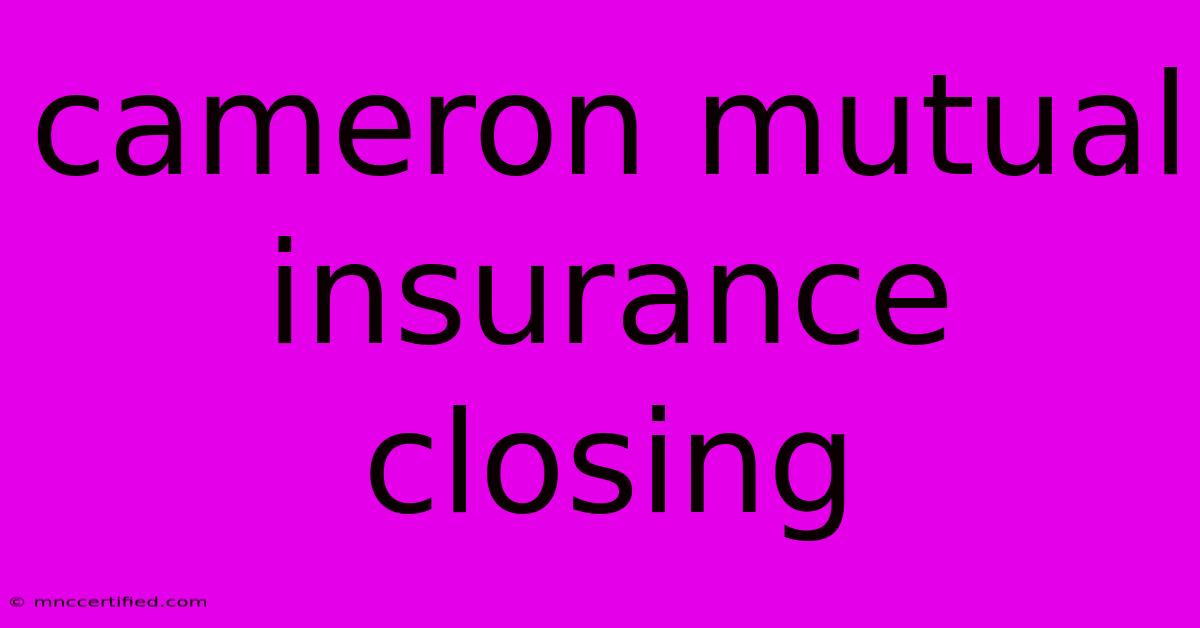Cameron Mutual Insurance Closing

Table of Contents
Cameron Mutual Insurance Closing: What it Means for Policyholders
The recent announcement of Cameron Mutual Insurance's closing has left many policyholders with questions and concerns. This comprehensive guide aims to clarify the situation, outlining the implications for affected individuals and offering advice on navigating this transition. We'll cover key aspects like policy transfer, claims handling, and finding suitable replacement insurance.
Understanding the Closure of Cameron Mutual Insurance
The closure of an insurance company, especially a mutual one like Cameron Mutual, can be a significant event. Mutual companies are owned by their policyholders, making the closure even more impactful. While the specific reasons behind Cameron Mutual's closing may vary (and details should be sought from official announcements), common factors contributing to such closures include:
- Financial Instability: Insufficient reserves to cover claims, rising operational costs, or poor investment performance can lead to insolvency.
- Regulatory Issues: Non-compliance with state regulations or significant violations can force a company to close.
- Market Conditions: Increased competition, shifts in market demand, or catastrophic events can severely impact a smaller insurer's ability to remain viable.
Regardless of the cause, policyholders are the primary concern during a company closure. Understanding your rights and available options is crucial.
What Happens to My Cameron Mutual Insurance Policy?
The process of transitioning your policy after a company closure is usually managed by state insurance regulators. In most jurisdictions, a process of conservation or rehabilitation might be initiated, aiming to either restore the insurer's financial stability or facilitate an orderly wind-down. Often, this involves:
- Policy Transfer: The state's guaranty association (a non-profit organization that protects policyholders) will likely step in to transfer your existing policies to another reputable insurance provider. This is typically a seamless transition, but you may experience minor changes in coverage or premiums.
- Claim Handling: Existing claims will continue to be processed, though there might be some delays due to the transition. Keep all documentation related to your claims and actively follow up if necessary.
- Premium Payments: Any premium payments made before the closure should be honored, and your coverage will continue until the official transfer of your policy is complete.
It is crucial to contact your state's insurance department immediately to understand the specifics of the transfer process and to address any concerns you may have. Their website is the best source for updated information and contact details.
Finding Replacement Insurance: A Step-by-Step Guide
Even with the policy transfer facilitated by the guaranty association, you may wish to explore alternative insurance providers. Consider these steps:
- Compare Quotes: Obtain quotes from multiple insurance companies to compare coverage options and prices. Online comparison tools can simplify this process.
- Review Coverage: Carefully review the policy details of each quote, paying close attention to coverage limits, deductibles, and exclusions. Ensure the new policy adequately protects your assets.
- Check Ratings: Assess the financial stability and reputation of potential insurers by checking ratings from agencies like A.M. Best. This will help ensure the long-term reliability of your chosen provider.
- Read Reviews: Read online reviews from other policyholders to get an idea of the customer service experience and claims handling process of different companies.
- Consider Your Needs: Choose an insurer that provides the right level of coverage for your specific needs and budget.
Staying Informed: Key Resources and Next Steps
- Your State's Insurance Department: This is your primary source of information regarding the closure of Cameron Mutual and the policy transfer process.
- The National Association of Insurance Commissioners (NAIC): The NAIC offers resources and information on insurance regulations and consumer protection.
- Your Insurance Agent (if applicable): If you worked with an insurance agent, contact them for guidance and assistance during this transition.
The closure of Cameron Mutual Insurance is a challenging situation, but proactive steps and access to the right information can help you navigate the transition smoothly. Remember to stay informed, act promptly, and prioritize finding suitable replacement insurance coverage to protect your assets.

Thank you for visiting our website wich cover about Cameron Mutual Insurance Closing. We hope the information provided has been useful to you. Feel free to contact us if you have any questions or need further assistance. See you next time and dont miss to bookmark.
Featured Posts
-
Does Car Insurance Cover Lawsuit
Nov 22, 2024
-
Blair Leads Tributes To Prescott
Nov 22, 2024
-
Does Insurance Cover Skin Checks
Nov 22, 2024
-
Enjoy Boba And Toast Hey Bobo
Nov 22, 2024
-
Harris Remarks On Reids Death
Nov 22, 2024